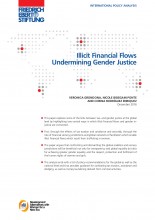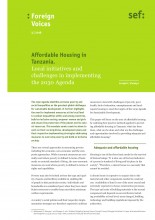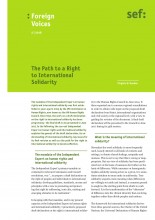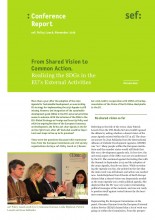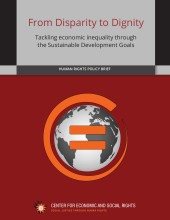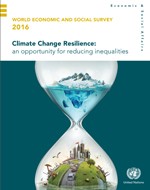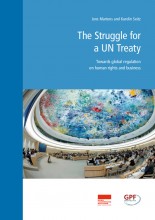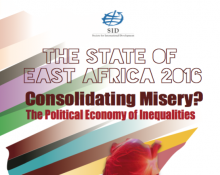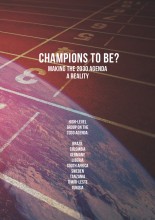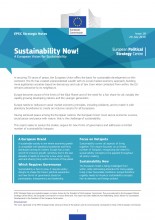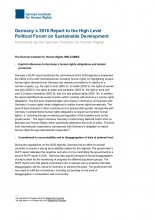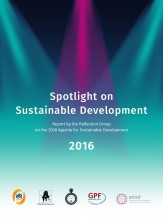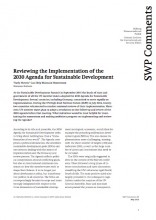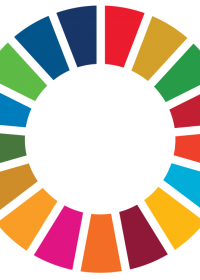
Sustainable Development & Human Rights - Archive
By Sarah Dayringer
The Inter-agency and Expert Group on Sustainable Development Goal Indicators (IAEG-SDGs) was established by the UN Statistical Commission in 2015 to develop an indicator framework for the monitoring of the goals and targets of the 2030 Agenda for Sustainable Development at the global level, and to support implementation of the Sustainable Development Goals (SDGs).
The 27 Group members met for their 4th meeting in November 2016 to:
- finalise the initial tier system for the SDG global indicators [...]
by Shiney Varghese, Sr. Policy Analyst, IATP
On 21 September 2016 the newly convened High Level Panel on Water (HLPW), called for a fundamental shift in the way the world looks at water. Supported by the World Economic Forum and its water initiative, the HLPW was formed to help “build the political momentum” to deliver on the UN mandated Sustainable Development Goal (SDG) on “water and related targets” that the UN member [...]
Heads of state and government leaders from around the globe have descended on the United Nations in New York for the 71st United Nations General Assembly. Their “general debate” on 20 September will focus on the theme: The Sustainable Development Goals: a universal push to transform our world.
To push forward with implementation of the Sustainable Development Goals (SDGs), the incoming President of the General Assembly, Peter Thomson of Fiji, has created a special advisory group on the Sustainable Development Goals.
Independent [...]
By Aldo Caliari
Due to UNCTAD’s decidedly pro-South and uncompromising development-focused mission, its quadrennial conferences have traditionally been North –South showdowns. Coming a few months after the adoption of the ambitious and universal 2030 Agenda for Sustainable Development and its 17 associated goals, the theme of the XIV Quadrennial Conference of UNCTAD (the United Nations Conference on Trade and Development) was “From Decisions to Actions.” There was, therefore, reason to expect that this time members would bridge their differences for [...]
"People do not eat GDP: Even as the economies of EAC member states have been recording considerable growth rates, this growth has been accompanied by a growth in inequality in virtually all countries."
This is the one of the key observations of the State of East Africa Report 2016 published by the Society for International Development. GDP figures (with a regional annual average increase of 6% since 2011) tell the story of an economic expansion that has taken [...]
The 2030 Agenda for Sustainable Development was adopted by world leaders at a United Nations summit on 25 September 2015. It is an ambitious, universal Agenda in which 193 states commit to protecting people and the planet and to ensuring sustainable development in three dimensions – social, economic and environmental – in all parts of the world by 2030. During the summit, the Swedish prime minister and heads of state and government from Brazil, Colombia, Germany, Liberia, South Africa, Tanzania [...]
The European Political Strategy Centre, a subsidiary branch of the European Commision, has published a new report titled "Sustainability Now!". The report authored by Karl Falkenberg, says that while Europe should be applauded for its many achievements, it needs to become aware of the limits of the Blue Planet and of the need for a fair share for all, notably the rapidly growing developing nations and the younger generation.
Europe needs to rediscover social market economy principles, including solidarity, and [...]
The German Institute for Human Rights comments on Germany's 2016 Report to the High Level Political Forum on Sustainable Development.
The German Institute for Human Rights welcomes:
- Explicit references to Germany´s human rights obligations and related processes
- Commitment to accountability and to disaggregation of data at national level
The German Institute for Human Rights is concerned that
- National measures and indicators do not systematically build on national challenges
- The draft National Sustainability Strategy does not include details on civil society [...]
Independent monitoring and review of the implementation of the 2030 Agenda and its structural obstacles and challenges are key factors for the success of the SDGs. It is for this reason, the Reflection Group on the 2030 Agenda for Sustainable Development together with other civil society organizations and networks has produced the first annual Spotlight Reportassessing the implementation of the 2030 Agenda and the structural obstacles in its realization. The report puts a spotlight on the fulfillment of the [...]
Shadow reporting is a well-established tool of civil society when it comes to holding governments accountable. A number of CSOs have already started to prepare shadow or spotlight reports or similar monitoring tools to follow-up on their governments efforts to implement the 2030-Agenda, especially its 17 goals and 169 targets. The main focus in this first year’s reports was to devise and discuss methodologies and to monitor governments’ efforts on drafting national implementation plans or strategies. In future reports they [...]
Shadow reporting is a well-established tool of civil society when it comes to holding governments accountable. A number of CSOs have already started to prepare shadow or spotlight reports or similar monitoring accounts to follow-up on their governments efforts to implement the 2030-Agenda, especially its 17 goals and 169 targets. The main focus in this first year’s reports was to devise and discuss methodologies and to monitor governments’ efforts on drafting national implementation plans or strategies. In future reports they [...]
Independent monitoring and review of the implementation of the 2030 Agenda and its structural obstacles and challenges are key factors for the success of the SDGs. It is for this reason, a global alliance of civil society organizations and networks has agreed to produce an annual Spotlight Report assessing the implementation of the 2030 Agenda and the structural obstacles in its realization. The report puts a spotlight on the fulfillment of the 17 goals, with a particular focus on inequalities [...]
By Marianne Beisheim
At the Sustainable Development Summit in September 2015 the heads of state and government of all the UN member states adopted the 2030 Agenda for Sustainable Development. Several countries, including Germany, committed to move rapidly on implementation. During the UN High-level Political Forum (HLPF) in July 2016, twentytwo countries volunteered to conduct national reviews of their implementation. Moreover, UN member states plan to adopt a resolution on the follow-up and review of the 2030 Agenda before that [...]

